|
|
|
Sort Order |
|
|
|
Items / Page
|
|
|
|
|
|
|
| Srl | Item |
| 1 |
ID:
137378
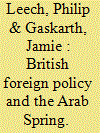

|
|
|
|
|
| Summary/Abstract |
The British government’s varied responses to the popular uprisings of the “Arab Spring” have been criticised for being inconsistent and/or selective. British actions ranged from providing substantial military support for the rebels in Libya to offering notably muted reactions to government suppression of protests in Bahrain. On assuming office, the new foreign secretary, William Hague, suggested that Britain would have a networked approach to foreign policy with a greater awareness of the bilateral interests that Britain had with other countries around the world. This analysis offers a provisional examination of the security, economic, and societal networks that Britain holds with states in the Arab world and, in doing so, tests whether these have any correlation with the British government’s policy towards protests in the region.
|
|
|
|
|
|
|
|
|
|
|
|
|
|
|
|
| 2 |
ID:
131435
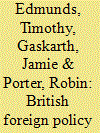

|
|
|
|
|
| Publication |
2014.
|
| Summary/Abstract |
In July 2013, Chatham House hosted a workshop under the auspices of the Global Insecurities Centre of the University of Bristol and the British Foreign Policy Working Group of the British International Studies Association, to explore these challenges. Four of the papers presented at that conference have been chosen for this special selection.
|
|
|
|
|
|
|
|
|
|
|
|
|
|
|
|
| 3 |
ID:
074653
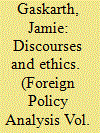

|
|
|
|
|
| Publication |
2006.
|
| Summary/Abstract |
The last decade has given rise to a wealth of literature on the ethics of British foreign policy. However, much of this has focused on a few narrow issues based around specific policy actions. As such, it has largely been reactive and mirrored governmental attitudes to the possibilities in foreign policy and the constraints under which decisions are made. Important issues, such as how the concepts of foreign policy and ethics have been described and enacted historically in Britain, the political effects of these past readings, and how the idea of discussing ethics should be so controversial, are underexplored. To investigate these naturalized understandings, this article conducts a discourse analysis of the articulation of foreign policy in Hansard over the last century. In doing so, it seeks to explore how past expressions of foreign policy and ethics privilege certain ways of thinking about policy and exclude others through their modes of description. The effect of these structures, it is argued, is to suppress democratic dissent and individual accountability and marginalize discussion on the (contestable) ethical basis of policy making and policy behavior.
|
|
|
|
|
|
|
|
|
|
|
|
|
|
|
|
| 4 |
ID:
105722
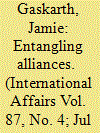

|
|
|
|
|
| Publication |
2011.
|
| Summary/Abstract |
The global war on terrorism gives rise to a range of legal, political and ethical problems. One major concern for UK policy-makers is the extent to which the government may be held responsible for the illegal and/or unethical behaviour of allies in intelligence gathering-the subject of the forthcoming Gibson inquiry. The UK government has been criticized by NGOs, parliamentary committees and the media for cooperating with states that are alleged to use cruel, inhuman and degrading treatment (CIDT) or torture to gain information about possible terrorist threats. Many commentators argue that the UK's intelligence sharing arrangements leave it open to charges of complicity with such behaviour. Some even suggest the UK should refuse to share intelligence with countries that torture. This article refutes this latter view by exploring the legal understanding of complicity in the common law system and comparing its more limited view of responsibility-especially the 'merchant's defence'-with the wider definition implied in political commentary. The legal view, it is argued, offers a more practical guide for policy-makers seeking to discourage torture while still protecting their citizens from terrorist threats. It also provides a fuller framework for assessing the complicity of policy-makers and officials. Legal commentary considers complicity in relation to five key points: identifying blame; weighing the contribution made; evaluating the level of intent; establishing knowledge; or, where the latter is uncertain, positing recklessness. Using this schema, the article indicates ways in which the UK has arguably been complicit in torture, or at least CIDT, based on the information publicly available. However, it concludes that the UK was justified in maintaining intelligence cooperation with transgressing states due to the overriding public interest in preventing terrorist attacks.
|
|
|
|
|
|
|
|
|
|
|
|
|
|
|
|
| 5 |
ID:
191678
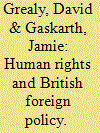

|
|
|
|
|
| Summary/Abstract |
This Special Issue brings the broader history of ‘ethical’ foreign policymaking in the UK into conversation with more contemporary case studies. In doing so, it highlights key issues that have shaped, and will continue to impact, Britain’s ability to play a leading role in the advancement of human rights norms and institutions as a ‘middle power’ within a shifting global order (Cooper and Dal, Citation2016; Efstathopoulos Citation2018; Murray and Brianson Citation2019). For some time, scholarly engagement with the ethics of British foreign policy and human rights promotion was dominated by discussion of New Labour’s foreign policy outlook as articulated in Robin Cook’s ‘mission statement’ for the Foreign and Commonwealth Office (FCO) in May 1997. British foreign affairs, Cook asserted, must have an ‘ethical dimension’ and the Labour government would therefore put human rights ‘at the heart’ of its foreign policy – a line that morphed in the media into ‘ethical foreign policy’ (Guardian, Citation1997). While New Labour has been credited for breaking new ground in terms of British engagement with the international human rights regime, this Special Issue looks to examine periods either side of the Cook era, to gain a wider historical picture of how human rights have been incorporated into British foreign policy (Wheeler and Dunne Citation1998; Gaskarth Citation2006; Gilmore Citation2015).
|
|
|
|
|
|
|
|
|
|
|
|
|
|
|
|
| 6 |
ID:
189740
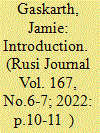

|
|
|
|
|
| Summary/Abstract |
This special feature emerged from a workshop on the UK’s tilt to the Indo-Pacific, organised by the Open University and the Council on Geostrategy and involving academics as well as UK government officials. It aims to unpack the assumptions of the 2021 Integrated Review and to offer practical insights into the opportunities and challenges of the UK’s future engagement with the region.
|
|
|
|
|
|
|
|
|
|
|
|
|
|
|
|
| 7 |
ID:
131439
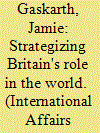

|
|
|
|
|
| Publication |
2014.
|
| Summary/Abstract |
In recent commentaries on British foreign policy, the New Labour and coalition governments have been criticized for lacking strategic thinking. Academics describe a 'strategy gap' and note that old ideas about Britain's role in the world, such as Churchill's 1948 reference to 'three circles', continue to be recycled. Parliamentarians bemoan the 'uncritical acceptance of these assumptions' that has led to 'a waning of our interests in, and ability to make, National Strategy'. This article argues that a primary problem has been the lack of consideration of how identity, strategy and action interrelate in foreign policy. Using the insights of role theory, the article seeks to address this by outlining six ideal-type role orientations that the UK might fulfil in world politics, namely: isolate, influential (rule of law state), regional partner, thought leader, opportunist-interventionist power and Great Power. By considering how variations in a state's disposition towards the external environment translate into different policy directions, the article aims both to highlight the range of roles available to policy-makers and to emphasize that policy often involves making a choice between them. Failure to recognize this has resulted in role conflicts and policy confusion. In setting out a variety of different role orientations, the author offers a route to introducing a genuine strategic sensibility to policy-making, one that links identity with policy goals and outcomes.
|
|
|
|
|
|
|
|
|
|
|
|
|
|
|
|
| 8 |
ID:
142304
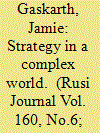

|
|
|
|
|
| Summary/Abstract |
Although it is commonplace to describe today's security environment as ‘complex’, there are still pockets of coherence around which policy-makers can anchor their strategy. Jamie Gaskarth argues that attempts to mirror the supposedly disorderly global security world with a disorderly strategy have led only to confusion, inefficiency and declining public support. Instead, the government needs to grapple with British identity and link this to a coherent narrative about how and why it wants to act in the future.
|
|
|
|
|
|
|
|
|
|
|
|
|
|
|
|
| 9 |
ID:
189741
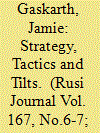

|
|
|
|
|
| Summary/Abstract |
The 2021 Integrated Review was informed by two assumptions: that leaving the EU would allow a more agile foreign policy based on ad hoc groups; and that a global shift in power towards the Indo-Pacific meant that the UK needed to engage more with the region. Jamie Gaskarth argues that the missing element to this strategy is a networked approach. Using the insights of network theory and social network analysis, policymakers should be aiming to analyse the social dynamics of the region in a more systematic way. This would allow them to better identify opportunities for greater connectedness and the benefits these may bring, as well as the limits to UK engagement, and non-linear effects that network spillovers can produce.
|
|
|
|
|
|
|
|
|
|
|
|
|
|
|
|
| 10 |
ID:
117053
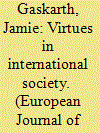

|
|
|
|
|
| Publication |
2012.
|
| Summary/Abstract |
Although there has been a significant growth in the literature on the ethics of international politics in recent years, much of this has focused on the normative structure of international relations and has downplayed the role of individuals in constituting the understandings and actions in this practice. However, individual agency and accountability are apparent in recent world events. Meanwhile, developments in moral philosophy have increasingly led scholars to re-examine the role that individual character traits - virtues - have in affecting how norms are selected and operationalized. Building on these insights, I argue here that a fully realized appreciation of the morality of international politics requires us to consider what character traits - virtues - its individual participants are expected to exhibit to support and realize its norms. To do so, I begin by outlining how the virtues are deemed to underpin ethical practice and highlight two forms of analysis that may be used to explore this: decision-oriented virtue ethics and constitutive virtue ethics. I then suggest that these can be used to analyse the ethical foundations of international society. Specifically, I adopt a constitutive virtue ethics approach to show how the virtues help to constitute international society using the case study of the establishment of the International Criminal Court. In the process, I aim to highlight both the extent to which the virtues are a feature of the rhetoric of global politics, and - more importantly - how they play a significant role in normative practice.
|
|
|
|
|
|
|
|
|
|
|
|
|
|
|
|
| 11 |
ID:
101750
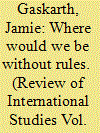

|
|
|
|
|
| Publication |
2011.
|
| Summary/Abstract |
Recent decades have seen a heightened interest in the ethics of foreign policymaking. This literature has overwhelmingly explored the ethical dilemmas faced by policymakers in terms of situations and the structures - either political/economic, normative and/or linguistic - that shape actions. The subjective experience of ethical decisionmaking in this arena and the character of the individuals making policy choices have been largely neglected. However, the apparently greater scope for moral action in the post-Cold War era, combined with the growth in global institutions designed to enforce individual accountability - such as the International Criminal Court - suggest that more effort should be placed on understanding ethics in terms of the individual. This article seeks to combine the work of political and social psychologists with the philosophical literature on virtue theory to see what new insights these might offer into the ethics of foreign policy. It argues that virtue ethics provide an effective means to critique the morality of foreign policy decisions. This is evinced by an exploration of Tony Blair's decision to go to war with Iraq in 2003.
|
|
|
|
|
|
|
|
|
|
|
|
|
|
|
|
| 12 |
ID:
191682
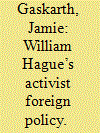

|
|
|
|
|
| Summary/Abstract |
Assuming office as UK Foreign Secretary in 2010, William Hague asserted a desire to pursue an ‘activist foreign policy’. Despite studies into Hague’s period in office, the significance of this phrase and its implications for Hague’s diplomacy have been overlooked. This article plugs that gap. It suggests ‘activist foreign policy’ merges two separate and potentially conflicting practices, namely, activism and diplomacy. Using insights from the practice turn, we examine two policies of Hague’s tenure: his promotion of the Prevention of Sexual Violence Initiative (PSVI), 2012–2014 and his diplomatic response to the Syria conflict, 2011–2014. Exploring these cases highlights the creative potential of merging practices, but also the extent to which they can conflict in ways that provoke resistance from other participants. The article concludes that policymakers looking to merge practices need to be aware of the underlying logic of behaviours and actions within each practice to transpose them successfully.
|
|
|
|
|
|
|
|
|
|
|
|
|
|
|
|
|
|
|
|
|